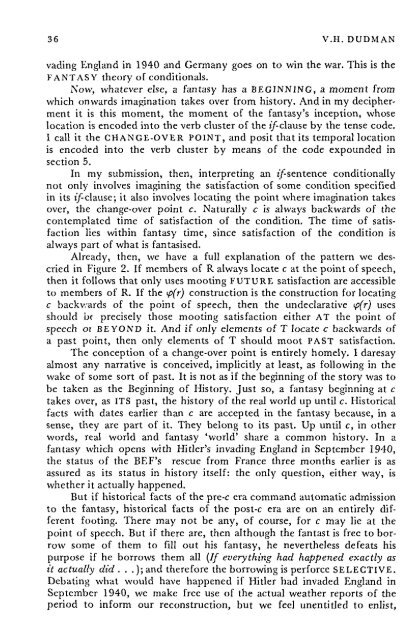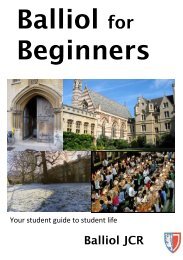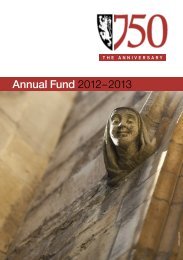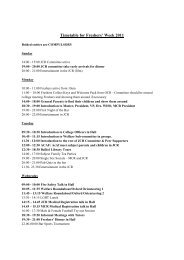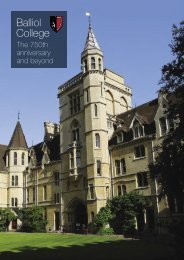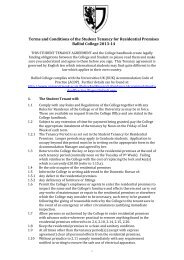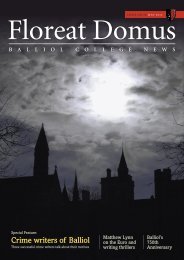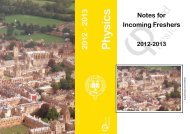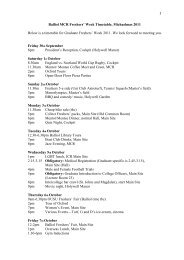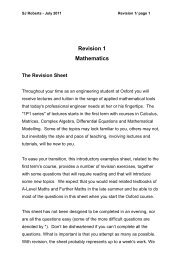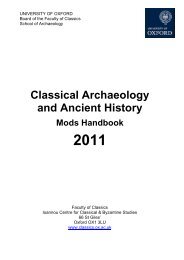TENSE AND TIME IN ENGLISH VERB CLUSTERS OF THE ...
TENSE AND TIME IN ENGLISH VERB CLUSTERS OF THE ...
TENSE AND TIME IN ENGLISH VERB CLUSTERS OF THE ...
- No tags were found...
You also want an ePaper? Increase the reach of your titles
YUMPU automatically turns print PDFs into web optimized ePapers that Google loves.
36 V.H. DUDMAN<br />
vading England in 1940 and Germany goes on to win the war. This is the<br />
FANTASY theory of conditionals.<br />
Now, whatever else, a fantasy has a BEG<strong>IN</strong>N<strong>IN</strong>G, a moment from<br />
which onwards imagination takes over from history. And in my decipherment<br />
it is this moment, the moment of the fantasy's inception, whose<br />
location is encoded into the verb cluster of the (/"-clause by the tense code.<br />
I call it the CHANGE-OVER PO<strong>IN</strong>T, and posit that its temporal location<br />
is encoded into the verb cluster by means of the code expounded in<br />
section 5.<br />
In my submission, then, interpreting an (/"-sentence conditionally<br />
not only involves imagining the satisfaction of some condition specified<br />
in its i/-clause; it also involves locating the point where imagination takes<br />
over, the change-over point c. Naturally c is always backwards of the<br />
contemplated time of satisfaction of the condition. The time of satisfaction<br />
lies within fantasy time, since satisfaction of the condition is<br />
always part of what is fantasised.<br />
Already, then, we have a full explanation of the pattern we descried<br />
in Figure 2. If members of R always locate c at the point of speech,<br />
then it follows that only uses mooting FUTURE satisfaction are accessible<br />
to members of R. If the ip(r) construction is the construction for locating<br />
c backwards of the point of speech, then the undeclarative tp(r) uses<br />
should be precisely those mooting satisfaction either AT the point of<br />
speech oi BEYOND it. And if only elements of T locate c backwards of<br />
a past point, then only elements of T should moot PAST satisfaction.<br />
The conception of a change-over point is entirely homely. I daresay<br />
almost any narrative is conceived, implicitly at least, as following in the<br />
wake of some sort of past. It is not as if the beginning of the story was to<br />
be taken as the Beginning of History. Just so, a fantasy beginning at c<br />
takes over, as ITS past, the history of the real world up until c. Historical<br />
facts with dates earlier than c are accepted in the fantasy because, in a<br />
sense, they are part of it. They belong to its past. Up until c, in other<br />
words, real world and fantasy 'world' share a common history. In a<br />
fantasy which opens with Hitler's invading England in September 1940,<br />
the status of the BEF's rescue from France three months earlier is as<br />
assured as its status in history itself: the only question, either way, is<br />
whether it actually happened.<br />
But if historical facts of the pre-c era command automatic admission<br />
to the fantasy, historical facts of the post-c era are on an entirely different<br />
footing. There may not be any, of course, for c may lie at the<br />
point of speech. But if there are, then although the fantast is free to borrow<br />
some of them to fill out his fantasy, he nevertheless defeats his<br />
purpose if he borrows them all (// everything had happened exactly as<br />
it actually did . . .); and therefore the borrowing is perforce SELECTIVE.<br />
Debating what would have happened if Hitler had invaded England in<br />
September 1940, we make free use of the actual weather reports of the<br />
period to inform our reconstruction, but we feel unentitled to enlist,


